
|
GREATEST FILM SCENES 1950s (1) |
| Film Title/Year and Film Scene Description | |
|
# 53. All About Eve (1950) This film has a realistic, dramatic depiction of show business and backstage life of Broadway and the New York theater. Thematically, it provides an insightful diatribe against crafty, aspiring, glib, autonomous female thespians who seek success and ambition at any cost without regard to scruples or feelings. With approaching age, vain Broadway mega-star actress Margo Channing (Bette Davis) seeks the flattering attention of aspiring, captivating actress Miss Eve Harrington (Anne Baxter). When Margo's fiancee-to-be, theatrical director Bill Sampson (Gary Merrill), a show business veteran and one of Margo's inner circle, turns his attention toward Eve, her sympathy for Eve slowly turns into alienation and hostility. Paranoid and suspicious, Margo smells "disaster in the air" before a belated birthday (and welcome home from Hollywood) party for Bill. She is clearly plagued by jealousy, "age obsession" and "paranoiac insecurity" and she turns acerbic toward Eve - "she's a girl with so many interests." Margo begins to get roaring drunk and feels "Macbethish" in mood - she snidely calls Eve "the Kid" and "Junior," feeling menaced by the deceptive young actress. At the height of her bitchery, she warns some of the birthday party guests about what to expect in the film's most famous line - after finishing another martini, her slur is delivered as a lip-sneering, nasty admonition: "Fasten your seat belts, it's going to be a bumpy night." |

|
|
# 54. Sunset Boulevard (1950) Billy Wilder's dark, classic comedy/drama is perhaps the
most acclaimed, "behind the scenes" film about Hollywood and its legacies.
Legendary silent film star Gloria Swanson "autobiographically" portrays
a deluded actress whose career declined with the coming of the talkies
- she resolutely refuses to accept her forgotten status. In a flashback,
wealthy, aging, reclusive Norma Desmond (Gloria Swanson), Paramount's
greatest film star during the silent era (noted for saying "I am
big. It's the pictures that got small"), murders her struggling,
down-and-out depressed hack screenwriter Joe Gillis (William Holden). Max must explain the scene to a confused Norma: "This is the staircase of the palace." Norma readies herself: "Oh yes, yes...down below, they're waiting for the princess. I'm ready." Sweeping her gown around with one hand, she begins to descend the staircase for her final close-up. Max shouts more directions: "Cameras! Action!" The dead screenwriter narrates in voice-over, introducing her exit down the marble staircase in her decaying Hollywood mansion to the whir of cameras:
The film queen descends the marble staircase believing she is playing Salome in the most important scene of her career. At the bottom of the stairs, she has become so overjoyed that she has to have a word for the crew:
Then, Norma walks past the newsreel cameras and directly toward the offscreen cameras filming the scene. As one camera closes in on her face, her image goes into a blurry soft-focus, as Norma slips transcendently backward in time to her glory days, a time of illusion. |
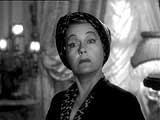  
|
|
# 55. A Place in the Sun (1951) George Stevens' romantic drama is a film adaptation of Theodore Dreiser's novel An American Tragedy - it emphasizes the wide gap between the frivolous rich and the downtrodden poor and how fate heavy-handedly controls life. A poor, uneducated, quiet, but ambitious and aspiring young man, George Eastman (Montgomery Clift), although considered a bit of an embarrassment to his wealthy, status-conscious aunt and uncle, he falls in love with his cousin, the Eastman's daughter Angela Vickers (Elizabeth Taylor). She is attracted by his boyish, shy, and handsome appearance, and he is attracted by the parties, dances, cars, clothes, upper-class lifestyle, and he begins to fall madly in love with the beautiful and wealthy young woman. In one of the greatest, most romantic performances ever filmed, in an extended scene of their budding romance, the film captures the sensuous and electrifying romantic interplay between them at the dance. Dancing with her, he appears sullen and Angela misinterprets his mood. She thinks that he seems strange, deep, reserved, and far away - holding something back. He doesn't want to spoil their nice evening by telling her that he has impregnated a co-worker, so he confesses his love to Angela, a love of an ideal woman which has now been discovered in her: "I love you. I've loved you since the first moment I saw you. I guess maybe I've loved you before I saw you." In a sensuous scene, Angela then begins to confess her love too, but then becomes totally self-conscious, looking around anxiously and hesitantly: "You're the fellow who wondered why I invited you here tonight. Well, I'll tell you why. I love...Are they watching us?" She pulls him out to the balcony terrace for privacy and replies reticently to his confession: "I love you too. It scares me. But it is a wonderful feeling." In these powerful erotic moments, their enormous, extreme closeups fill the screen as they reveal innermost emotions and inflamed passions. Angela tells him she can see him all summer by the lake on the weekends, when he isn't working: "We'll have such wonderful times together, just the two of us." George is on cloud nine: "I'm the happiest person in the world." Angela replies: "The second happiest." However, George is filled with guilt and repression: "Oh, Angela, if I could only tell you how much I love you, if I could only tell you all." She comforts him with an intimate reply while pulling him closer to her: "Tell mama, tell mama all." They embrace and kiss passionately, caught up in something over which they have no control. |

|
|
# 56. A Streetcar Named Desire (1951) Elia Kazan's film challenged the Production Code's censors with its bold adult drama and sexual subjects (rape, domestic violence, homosexuality, and female promiscuity or nymphomania) - it is the story of the pathetic mental and emotional demise of a determined, yet fragile, repressed and delicate Southern lady Blanche DuBois (Vivien Leigh) born to a once-wealthy family of Mississippi planters. Her downfall in the squalid, two-room French Quarter apartment of her married sister Stella Kowalski (Kim Hunter) and animalistic husband Stanley (Marlon Brando) is at the hands of savage, brutal forces in modern society. Marlon Brando, in his second screen appearance and recreating his Broadway role, delivers an overpowering, memorable performance. During a drunken, losing poker hand, Stanley becomes uncontrollably beserk, charges after his wife and assaults her with a few blows, causing a fight to break out to control his "lunacy." His poker buddies hold him under a cold shower to sober him up. Dripping wet with water, Stanley realizes he has struck and abused Stella, and feeling repentant, he searches for her. Stella and Blanche have sought protective refuge in an upstairs apartment. Animalistic and virile in a wet, torn T-shirt, he bellows repeatedly for Stella from the street in front of their building, begging for her return: "Hey Stell - Lahhhhh!" This scene is one of the most regularly-chosen clips played in film excerpts from cinematic history. With the low moan of a clarinet, Stella finally responds to her contradictory impulses - her anger melts into forgiveness, her fear into desire. She leaves the shelter of the upstairs apartment and stands staring down at him from the upper landing. Then, she surrenders herself to him - she slowly descends the spiraling stairs to him and comes down to his level. He drops to his knees, crying. She sympathizes with him as he presses his face to her pregnant belly, and they embrace and kiss. Stanley begs: "Don't ever leave me, baby," and then literally sweeps her off her feet - he carries her into their dark apartment for a night of passion. |
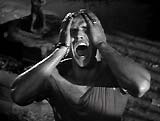 
|
|
# 57. High Noon (1952) One of the best and most beautifully-crafted westerns of all time portrays the lone figure of Marshal Kane (Gary Cooper) left to face four vengeful gunslingers who have arrived by train in the town of Hadleyville. In a powerful, memorable montage of cross-cut images, a few minutes before twelve noon, as tension, fear, and frustration register on Kane's face, he writes his last will and testament in his office. The silence is punctuated by the pendulum of his office's clock and the noon train's whistle. Kane places his will in a sealed envelope, writing on the outside: "To be opened in the event of my death." Before the exciting finale, he walks out onto the deserted main street and surveys its emptiness, resolute and resigned to his duty. His blonde, newlywed Quaker wife (Grace Kelly) and his ex-mistress - a half-Mexican saloon owner Helen Ramirez (Katy Jurado) ride past in an open buckboard wagon bound for the train station to leave town. The camera pulls back as he stands there helpless and immobile and watches them pass. At the depot, outlaw Frank Miller (Ian MacDonald), whom Kane helped send to prison years earlier, arrives on the noon train. Helen notices that Frank joins the other three gunmen at the station. A close-up of Kane's face shows sweat, exhaustion, and fear. A long, upward-moving crane shot pulls back, revealing his forsakenness amidst the storefronts and rooftops of the small community. His tiny figure slowly strides down the middle of the dirt street toward a gripping shootout sequence with the four killers. All alone, he has been utterly betrayed - no one is there to come to his aid: the Judge, his immature deputy, and all his friends and townspeople have turned their backs on him. Standing alone, Kane has decided that he must fight for his principles against all odds - a challenge he must meet even if it means his own death. |
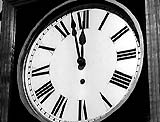  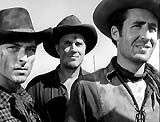 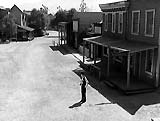 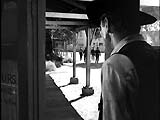
|
|
# 58. Singin' In the Rain (1952) The joyous title song sequence from this musical has become movie legend as the most famous dance number in American film - and it is Gene Kelly's finest solo performance ever. In a classic, heart-lifting, enchanting dance scene during a cloudburst, Don Lockwood (Gene Kelly) does a glorious performance of the title song "Singin' In the Rain," a spontaneous expression of his euphoric mood and happiness over his new-found love for Kathy Selden (Debbie Reynolds). He strolls down the empty two blocks of street in the rain passing shop windows (including a Pharmacy/Drug Store with a 'Smoke Mahout' window display, the Richard Carlane Music Studio, the LaValle Millinery Shop, the 'First Editions' Book Store, and Mount Hollywood Art School). At first, he keeps his umbrella open above him to keep dry, but after a few short steps, he shrugs and closes it (and either lays it on his shoulder, swings it, keeps it to his side, or imaginatively incorporates it into the number). He skips on the sidewalk, climbs on and swings around a lamppost, and saunters and sloshes along. Then, he jumps, and tap-dances through the puddles - becoming more and more child-like. He lets a drainpipe of rainwater drain on his upturned face, kicks up water, splashes, cavorts, and stamps around with sheer delight. After twirling on the cobble-stoned street, he balances on the street curb like a tightrope walker. When a mystified and vaguely hostile policeman finally walks over to find out what he is doing jumping up and down in deep puddles, and looks at him suspiciously, he reacts guiltily toward the authority figure. [When the camera cuts from one view to another, Kelly's two hands on the umbrella change to only his right hand on the umbrella.] He slows down, turns, and answers simply: "I'm dancin' and singin' in the rain." He closes his umbrella, grins boldly, walks off, hands his umbrella off to a needy passerby, and waves back toward the policeman from afar. |
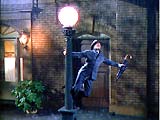
|
|
# 59. The Big Heat (1953) The film noirish, big-city crime classic and violent melodrama - Fritz Lang's film contains one of the most celebrated but disturbing scenes ever filmed - although the audience never sees it on camera. The film's heroine Debby Marsh (Gloria Grahame) is the beautiful moll and kept-woman of sadistic, cold-blooded Vince Stone (Lee Marvin), crime boss Mike Lagana's (Alexander Scourby) chief henchman. In the film's most vivid and frightening scene, Stone, in a rage, suspecting that she has lied to him about her whereabouts, maybe "played footsie when my back was turned," or has given out information to vengeful ex-cop Dave Bannion (Glenn Ford), the dressed-up punk disfigures one side of her pretty face by flinging a pot of scalding hot coffee on her. He reaches for the bubbling Pyrex pot and as the camera remains stationary on the burner, the soundtrack records the splash and screams as her face is scarred and burned. A victim of brutal violence, she rushes into the other room crying: "My face! My face!" |

|
|
# 60. From Here to Eternity (1953) One image has forever captured the image of an emotionally-dangerous, forbidden and career-threatening relationship - the one of two lovers being covered by rushing waves in the moonlight as they lie on an Hawaiian beach. Career soldier First Sergeant Milton Warden (Burt Lancaster) and the base captain's bored housewife Karen Holmes (Deborah Kerr) clandestinely meet at a park bench at Kuhio Beach Park away from Schofield Barracks, both of them with bathing suits under their clothing. Later during their rendezvous on a sandy Oahu beach, the waves crash in toward them in the film's most memorable, famous and shockingly torrid (for its day) love-making scene. Karen removes her outer clothing, and looks provocatively at the Sergeant as he strips down to his shorts. For a moonlight swim, she runs first into the water, encouraging him to join her. At the edge of the Hawaiian beach surf, the waves churn up white caps and breakers. The water rolls up the beach and races toward Karen and Warden, lying together. Their bodies are tightly locked and intertwined in an embrace as they kiss each other and the waves pour over them. She rises, prances up the sand, and collapses onto their blanket. |
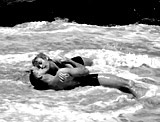    
|
|
# 61. Shane (1953) The echoing finale, as Shane rides off into the bluish distance of the empty Wyoming landscape after a poignant goodbye and farewell is an unforgettable sequence. Young Joey (Brandon de Wilde) is the only one to bid Shane, his mythical idolized hero, farewell. As gunfighter Shane starts to leave, he indicates to Joey that he will never return. Tears well up in Joey's eyes and Shane whispers quietly: "Bye, little Joe." The fringe-jacketed, lonely hero then rides off into the twilight meadow toward the distant hills framed against the sky and mountains, growing smaller and smaller in the distance. Young, anguished, and heartbroken Joey sadly calls out to his hero/idol in one of filmdom's most famous and haunting endings, as tears streak down his face:
The mountains echo Joey's plaintiff call. [Another most memorable scene: The gunning-down of innocent victim "Stonewall" Frank Torrey (Elisha Cook, Jr.) on a dark, black storm-clouded day by mean, murderous, merciless, hired gunman Wilson (Jack Palance). He is shot down on the primitive, muddy main street of the frontier town - violently thrown backwards and slamming into the thick black mud.] |
 
|
|
# 62. On the Waterfront (1954) The most famous, truthful scene of Elia Kazan's film is the one in the back of a New York taxi-cab between two brothers:
Charley advises Terry to keep his mouth shut and not testify about what he knows about the corrupt union bosses. He becomes exasperated with his stubborn brother's unwillingness to immediately comply. Charley suggests that if they get to their destination, 437 River Street, and Terry hasn't made up his mind, there may be serious consequences. Terry is stunned by his brother's words. Suddenly, Charley pulls a gun, threatening him to accept an easy dock job in exchange for keeping quiet. Surprised, Terry pushes the gun away, gently guiding it down: "Charley ... Charley ... Oh Charley. Wow." Embittered, Terry faces up to the fact that he has made nothing of his life, blaming his brother instead of his ex boxing manager. Terry is reminded of how he was given "a one-way ticket to Palookaville" in his boxing days when he knew he had a winner inside himself, but was told to lose. At one point in his life, he could have risen about his low-life condition through his skill as a prizefighter. He poignantly looks back to the night of the fight when he lost all his sense of personal worth and integrity. He realizes that his brother betrayed him and sold him out. He continues his sad, pitiable lament, and blames his brother for compromising and sacrificing his boxing career and his life, preventing him from becoming a contender for the title:
|
   
|
|
# 63a. The Night of the Hunter (1955) One of the greatest American films of all time is Charles Laughton's sole directorial effort, a truly compelling and terrifying classic masterpiece thriller filled with an array of startling images. A sinister, crazed, psychopathic, black-cloaked and hatted 'Preacher' Harry Powell (Robert Mitchum), one of the 'false prophets' of the 30s presents a chilling, perversely evil and memorable monologue to the Lord in the film's opening. He glances heavenward and delivers an insane prayer, revealing that he is a serial killer who receives divine inspirations to first marry, and then murder and rob women, usually rich lonely widows who do not see the evil in him. His left hand is tattooed with the letters "H - A - T - E" on his four fingers, and his right hand's knuckles with the letters "L - O - V - E" - which he explains in a memorable hand-wrestling scene. When a criminal's execution takes the secret of the location of stolen money to his death, the smooth-talking Preacher marries his widow Willa Harper (Shelley Winters) and then knifes her to death in a frightening yet subdued scene in their A-frame bedroom. The grisly sight of her corpse is a nightmarish, hypnotically-eerie image. It dissolves into view - water reeds flow in the underwater current with Willa's corpse strapped to the front seat of her model T submerged in the river. Her long hair is tangled with the river reeds and her throat is slashed. |
   
|
|
# 63b. The Night of the Hunter (1955) [In a classic confrontational scene between the phony, blaspheming 'false prophet' and a true, pure and strong Bible-fearing farm woman - a matriarchal widow named Mrs. Rachel Cooper (Lillian Gish), Powell lurks outside the farm house, singing his rendition of a gospel hymn ("Leaning on the Everlasting Arms" with the words: "Leaning, leaning..." In silhouette, Rachel appears like the portrait of Whistler's Mother, sitting in a rocking chair on her screened-in porch with the shotgun across her lap. Rachel counters his song, defiantly and harmoniously singing the authentic version of the Protestant religious hymn with a spiritual reference to Jesus: "Lean on Jesus, lean on Jesus," filling in the words that he has chosen to leave out in a simultaneous duet.] |

|
1950s (1) | 1950s (2) | 1960s | 1970-90s |
|